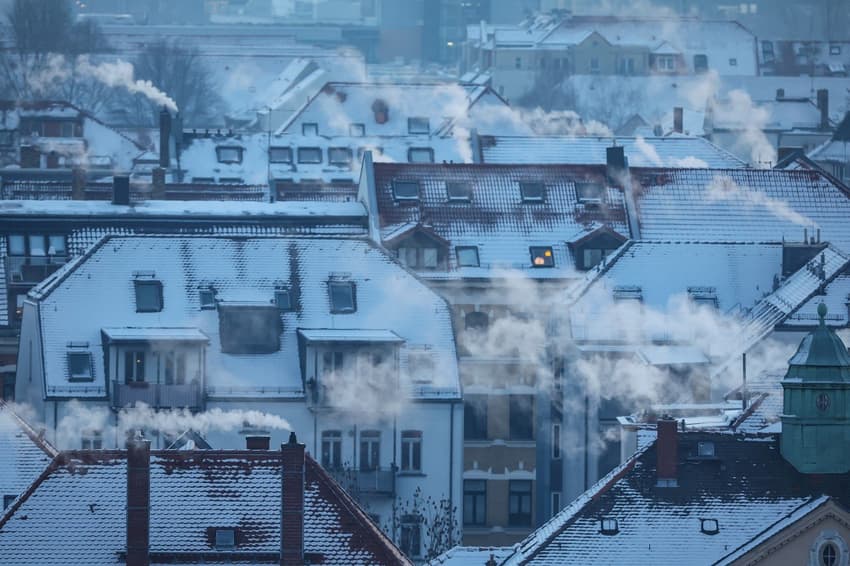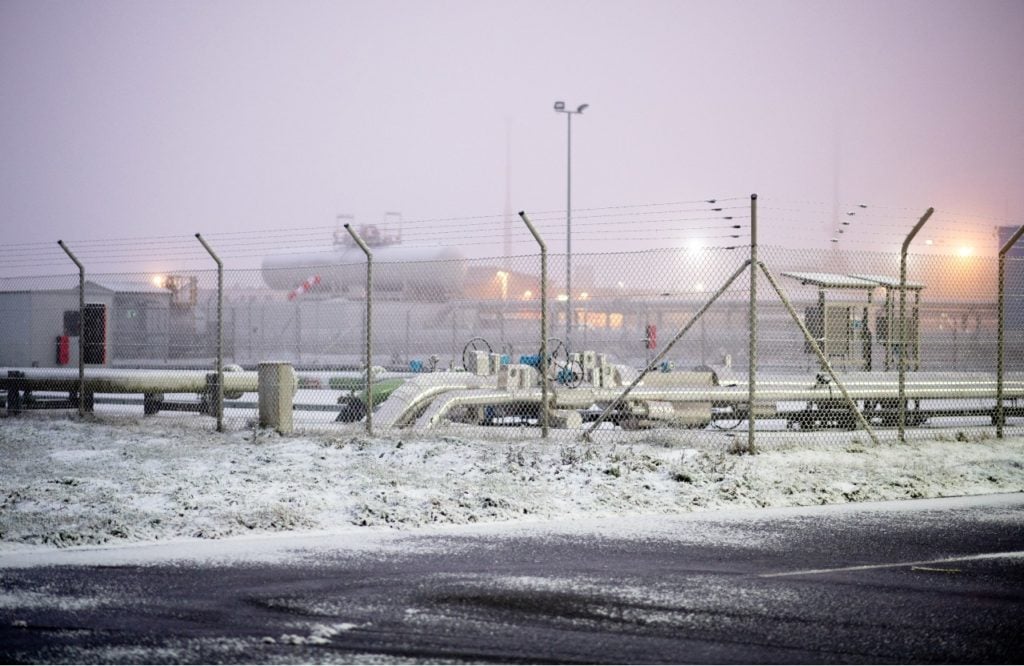EXPLAINED: Is cold weather threatening Germany’s gas supplies?

The icy temperatures in recent weeks have led Germany’s Federal Network Agency to upgrade its gas consumption monitor to "critical", but could cold weather really lead to gas shortages?
What’s going on?
Since Russia's invasion of Ukraine, gas supplies to Germany have been throttled, forcing the country to look for alternative energy sources and to keep a closer eye on gas supplies for the winter.
Although the gas storage facilities in Germany were completely full at the beginning of the winter, the weather plays a decisive role in how the situation will develop, as, at lower temperatures, more heating is needed and therefore more gas is consumed.
To ensure that Germany gets through the winter without gas shortages, the Federal Network Agency has called for at least a 20 percent reduction in gas consumption compared with previous years. But, so far in December, the colder temperatures have led to increased gas use and this target has been missed by a wide margin.
READ ALSO: Germans warned to reduce gas use amid 'coldest December in years'
Last week was 2.7 degrees colder than the average of previous years and, in the last two weeks, gas savings have only been at twelve percent.
In its Gas Emergency Plan, the Federal Network Agency therefore upgraded gas consumption from "tense" to "critical" last week. Gas consumption is one of five indicators used by the agency to monitor the gas situation.
Is the cold weather likely to continue?
According to data from the German Weather Service (DWD), September was comparatively cool, while October and November were warmer than average, which helped fill gas storage facilities ahead of schedule. But the average temperature across Germany so far in December has been around minus 1.4 C, making it currently the coldest since 2010, compared to the long-term average.
READ ALSO: German gas reserves 100 percent full following mild autumn
However, in the coming days, temperatures are set to rise again throughout the country and, by Friday, some areas are expected to see maximum temperatures between 12 and 15 C.
According to DWD it currently looks unlikely that Germany will experience a mild winter this year; their most recent models give a probability of five percent for this year's winter seeing above-average mild temperatures and a probability of 38 percent for a comparatively cold winter. The most likely scenario, according to the models, is an "average" winter compared to the past 30 years.
For the forecast, computer models are fed with current weather data such as temperature, air pressure and the current precipitation.
What will happen if Germany has a very cold winter?
According to the most recent models by the Science Media Center (SMC), there’s a good chance of getting through the winter in Germany without a gas shortage - but only if gas is saved, imports do not decrease too much, and the winter does not get too cold.

Technical facilities used for storing natural gas in caverns are located on the site of Storag Etzel GmbH. Photo: picture alliance/dpa | Hauke-Christian Dittrich
In the first and most pessimistic scenario modelled by the SMC, gas storage facilities could be completely empty by the beginning of March if gas consumption remains as high as the average for 2018 to 2021 and if Germany experiences a cold winter. Only if temperatures become moderate in winter and the inflow of gas remains quite high on balance could Germany get through the cold season without any savings, according to these calculations. However, the storage facilities would be almost empty in the spring, even in the best outcome of this scenario.
READ ALSO: Frosty roads and 'icy rain': Cold spell continues in Germany
In the second scenario, Germany has a better chance of getting through the winter without a gas shortage if ten percent less gas is consumed than in previous years. But here, too, the prerequisite is that the winter does not get too cold and the ratio of gas imports to exports remains roughly the same as in recent months.
In the third scenario, Germany will get through the winter without a gas shortage - even if the winter is cold and the gas inflow is lower – if 20 percent less gas is used than in previous years.
It’s important to bear in mind that these scenarios are model calculations and are not definite predictions of the future. However, they help to illustrate the path along which the filling levels of German gas storage facilities are likely to move.
What would happen if Germany did experience a gas shortage?
If Germany reaches a critical gas shortage, the economy ministry could declare an emergency level gas crisis, which would see the Federal Network Agency put in charge as national gas supply coordinator, meaning it would be responsible for allocating gas in close coordination with the network operators and potentially having to ration supplies.
Earlier in the year, the President of the Federal Network Agency, Klaus Müller, said the Agency had a crisis team of 65 people on standby which could organise gas distribution around the clock in shift operation in the event of an emergency.
"We have the appropriate infrastructure for this. Beds are there, and we've ordered emergency food supplies and filled the tanks for emergency power," he said.
Comments
See Also
What’s going on?
Since Russia's invasion of Ukraine, gas supplies to Germany have been throttled, forcing the country to look for alternative energy sources and to keep a closer eye on gas supplies for the winter.
Although the gas storage facilities in Germany were completely full at the beginning of the winter, the weather plays a decisive role in how the situation will develop, as, at lower temperatures, more heating is needed and therefore more gas is consumed.
To ensure that Germany gets through the winter without gas shortages, the Federal Network Agency has called for at least a 20 percent reduction in gas consumption compared with previous years. But, so far in December, the colder temperatures have led to increased gas use and this target has been missed by a wide margin.
READ ALSO: Germans warned to reduce gas use amid 'coldest December in years'
Last week was 2.7 degrees colder than the average of previous years and, in the last two weeks, gas savings have only been at twelve percent.
In its Gas Emergency Plan, the Federal Network Agency therefore upgraded gas consumption from "tense" to "critical" last week. Gas consumption is one of five indicators used by the agency to monitor the gas situation.
Is the cold weather likely to continue?
According to data from the German Weather Service (DWD), September was comparatively cool, while October and November were warmer than average, which helped fill gas storage facilities ahead of schedule. But the average temperature across Germany so far in December has been around minus 1.4 C, making it currently the coldest since 2010, compared to the long-term average.
READ ALSO: German gas reserves 100 percent full following mild autumn
However, in the coming days, temperatures are set to rise again throughout the country and, by Friday, some areas are expected to see maximum temperatures between 12 and 15 C.
According to DWD it currently looks unlikely that Germany will experience a mild winter this year; their most recent models give a probability of five percent for this year's winter seeing above-average mild temperatures and a probability of 38 percent for a comparatively cold winter. The most likely scenario, according to the models, is an "average" winter compared to the past 30 years.
For the forecast, computer models are fed with current weather data such as temperature, air pressure and the current precipitation.
What will happen if Germany has a very cold winter?
According to the most recent models by the Science Media Center (SMC), there’s a good chance of getting through the winter in Germany without a gas shortage - but only if gas is saved, imports do not decrease too much, and the winter does not get too cold.

In the first and most pessimistic scenario modelled by the SMC, gas storage facilities could be completely empty by the beginning of March if gas consumption remains as high as the average for 2018 to 2021 and if Germany experiences a cold winter. Only if temperatures become moderate in winter and the inflow of gas remains quite high on balance could Germany get through the cold season without any savings, according to these calculations. However, the storage facilities would be almost empty in the spring, even in the best outcome of this scenario.
READ ALSO: Frosty roads and 'icy rain': Cold spell continues in Germany
In the second scenario, Germany has a better chance of getting through the winter without a gas shortage if ten percent less gas is consumed than in previous years. But here, too, the prerequisite is that the winter does not get too cold and the ratio of gas imports to exports remains roughly the same as in recent months.
In the third scenario, Germany will get through the winter without a gas shortage - even if the winter is cold and the gas inflow is lower – if 20 percent less gas is used than in previous years.
It’s important to bear in mind that these scenarios are model calculations and are not definite predictions of the future. However, they help to illustrate the path along which the filling levels of German gas storage facilities are likely to move.
What would happen if Germany did experience a gas shortage?
If Germany reaches a critical gas shortage, the economy ministry could declare an emergency level gas crisis, which would see the Federal Network Agency put in charge as national gas supply coordinator, meaning it would be responsible for allocating gas in close coordination with the network operators and potentially having to ration supplies.
Earlier in the year, the President of the Federal Network Agency, Klaus Müller, said the Agency had a crisis team of 65 people on standby which could organise gas distribution around the clock in shift operation in the event of an emergency.
"We have the appropriate infrastructure for this. Beds are there, and we've ordered emergency food supplies and filled the tanks for emergency power," he said.
Join the conversation in our comments section below. Share your own views and experience and if you have a question or suggestion for our journalists then email us at [email protected].
Please keep comments civil, constructive and on topic – and make sure to read our terms of use before getting involved.
Please log in here to leave a comment.